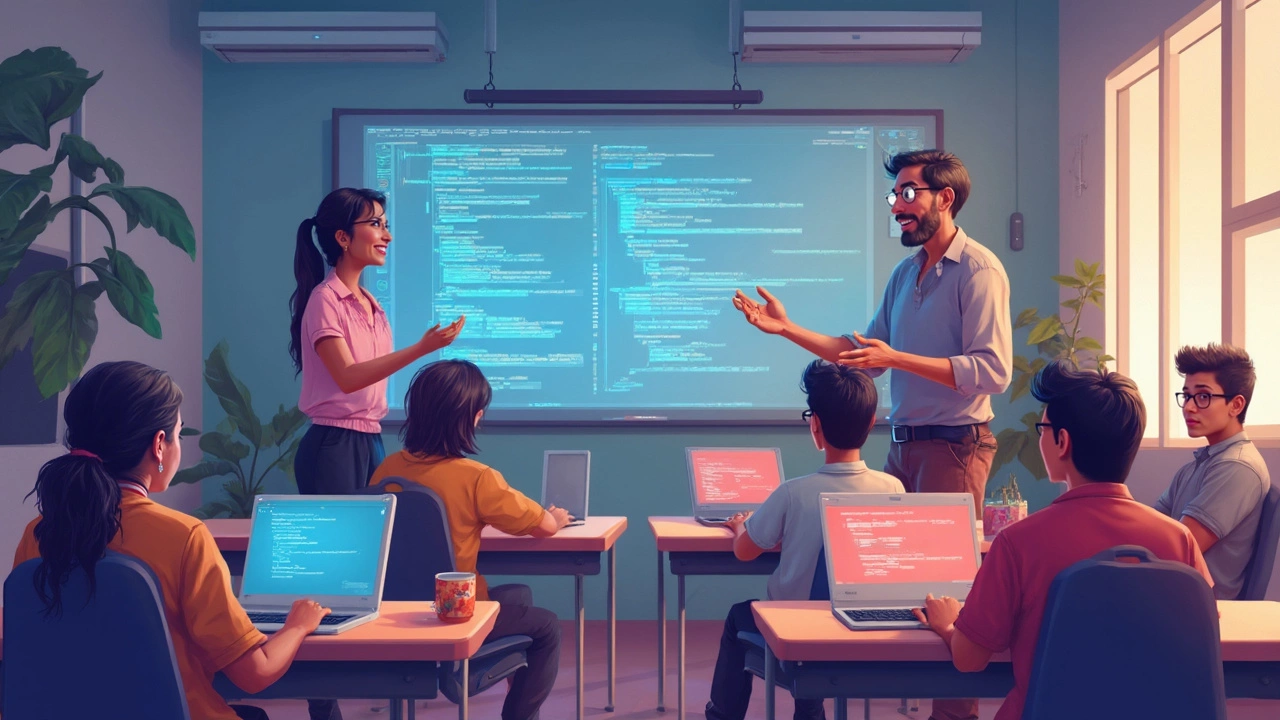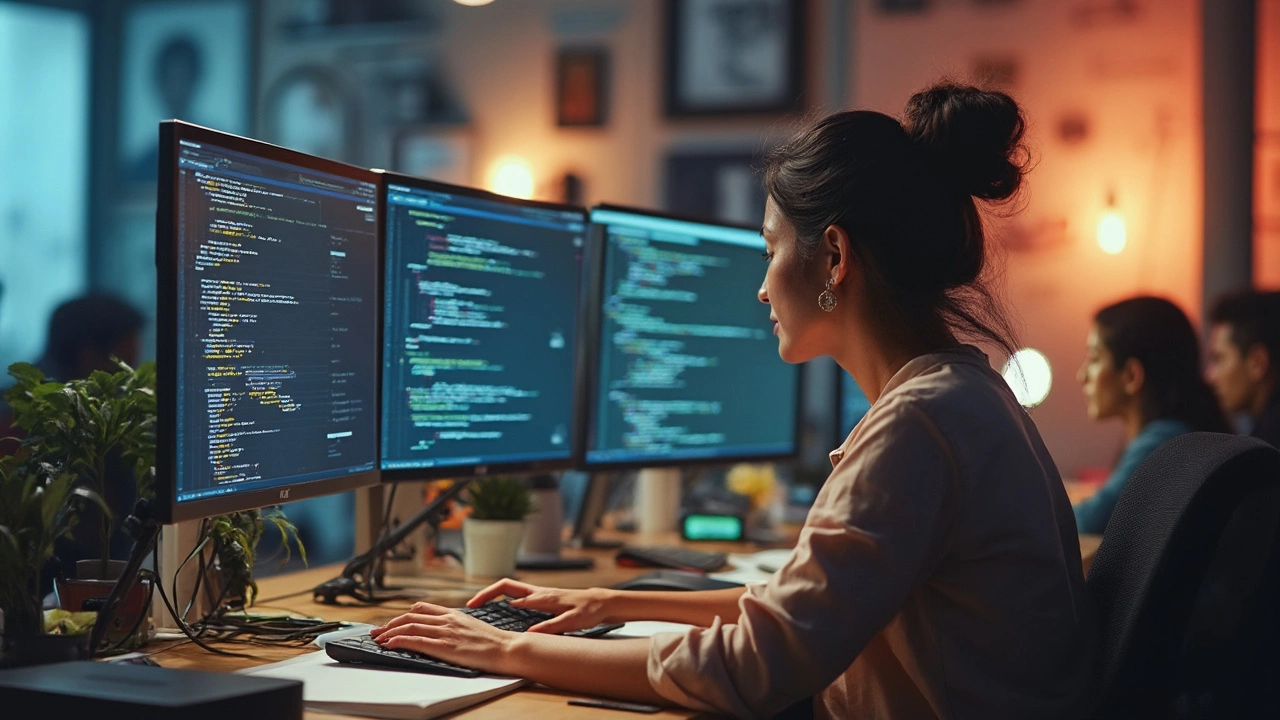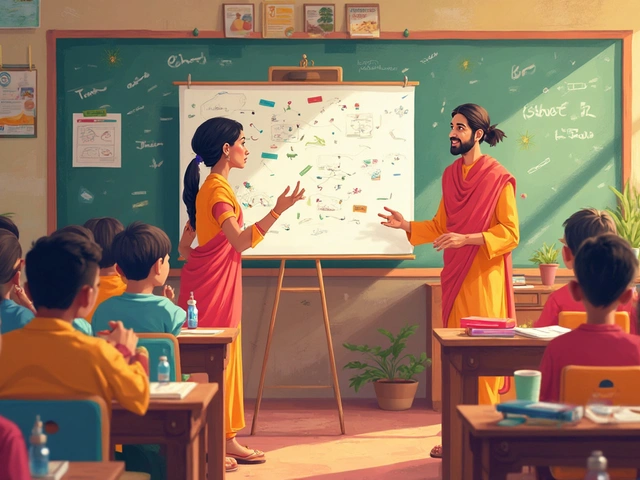
So, you've probably heard the terms 'coding' and 'programming' thrown around as if they're interchangeable. But here's the kicker: they're not! Let's get down to what really sets them apart.
First off, coding is essentially the language you use to tell a computer what to do. Think of it like typing up instructions that a computer will follow. It’s all about writing scripts, and learning languages like Python, Java, or C++. But here’s the catch: codes need perfect syntax, like spelling words correctly in a sentence.
Now, programming is like being the mastermind behind a tech project. It’s not just about writing code; it’s about solving problems, creating complex systems, and planning solutions from scratch. You're not only writing the script but also designing how everything fits together to achieve a bigger goal. It's like being an architect versus someone who just lays the bricks.
- Defining Coding
- Understanding Programming
- Coding as a Subset of Programming
- Skill Set Differences
- Real-World Examples
- Why It Matters
Defining Coding
Coding is where the action begins! It gets down to the nitty-gritty of telling computers what to do using specific languages. But what does that really mean? Let's break it down.
At its core, coding is the process of translating logical instructions into a language that computers can understand. These languages include Python, Java, and JavaScript, among others. Each language has its own syntax and rules, much like how English and Spanish have different grammar and vocabulary. Remember playing with Lego blocks as a kid? Coding is kind of like that—you're building something from scratch, one piece at a time, to create a bigger picture.
"Coding is the language of the future. It's almost like a superpower you can use to transform whole industries." – Mitch Resnick, MIT Media Lab
What's interesting is how coding requires attention to detail. A missing semicolon could mean the difference between functioning software and a broken program. Mistakes, even tiny ones, won't fly here. They're called 'bugs,' and they need to be squashed right away.
Why Coding Matters
So, why put in the effort to learn coding? For starters, it's a key component of software development. If you're fixing a car, coding is like using the right tools to get the wheels turning smoothly. It's the foundation for creating websites, applications, and pretty much anything that runs on electronic devices.
Remember, coding also encourages problem-solving. You encounter errors, you solve them. It's like a constant brain workout, keeping you sharp and curious.
Common Coding Languages
- Python: Great for beginners, used in web development and data analysis.
- JavaScript: Mainly used for front-end web development.
- Java: Popular in large-scale enterprise systems.
- C++: Often used in game development and high-performance apps.
Getting comfortable with coding is like learning a new sport. It might be challenging at first, but once you get the hang of it, the possibilities are endless!
Understanding Programming
Alright, let's dig a bit deeper into what programming is all about. At its core, programming is the art and science of creating software. It's more than just typing lines of code; it's about crafting commands to build applications that actually solve problems and do something useful.
Programming Languages
When you're programming, there’s a whole menu of languages to pick from: Python for ease and readability, Java for portability across platforms, and C++ for speed and performance. These languages help translate human logic into something machines can process.
Problem-Solving
Programming involves a lot of problem-solving. It's like playing detective. You have to break down big challenges into smaller, manageable tasks. This is where concepts like algorithms come into play. They're step-by-step methods designed to perform calculations, data processing, and automated reasoning tasks.
Planning and Design
Before even writing a single line of code, there's a whole planning stage. This might involve flowcharts, prototypes, and software architecture models. Essentially, you’re sketching out the blueprint before getting your hands dirty.
- Define the scope: What does the program need to accomplish?
- Design the system: How will all the parts fit together?
- Develop the solution: Start coding to bring your plan to life.
Debugging and Testing
Once you have a working version, it's time to play whack-a-mole with bugs. Testing and debugging ensure that your software does exactly what it's supposed to do under all sorts of conditions. It’s a bit like proofreading a novel—you have to catch and fix all the errors before anyone reads it.
With programming, you’re not just creating code. You're practically building something from nothing—like crafting a bridge between what users want to achieve and the tech that makes it happen. That's why understanding programming is such a crucial part of the coding classes you might be considering. You get to learn how everything fits together to make tech work in the real world.
Coding as a Subset of Programming
Ever thought of coding as just one piece of the puzzle? Well, that's pretty spot on! Coding fits right inside the broader umbrella of programming, and here's how it plays out.
At its core, coding is about writing lines of code—the actual syntax that makes your computer do stuff. It’s like writing a single recipe in a cookbook. Meanwhile, programming is about creating the entire cookbook. You're outlining chapters, deciding what recipes go where, and making sure they all work together to provide a delicious meal.
Breaking Down the Roles
So, why is coding a baby of the programming family? It's because, in a full-fledged programming project, coding is just one part. There’s also planning, testing, debugging, and maintaining the code, which are all crucial elements of programming.
- Planning: This involves requirements gathering and deciding on the scope of the project. It's the blueprint phase.
- Coding: Here’s where coding classes come into play — learning the languages to actually write the instructions.
- Testing: You gotta make sure everything works perfectly. This involves running through the code, checking for errors.
- Debugging: Fixing those nasty bugs that pop up along the way.
- Maintenance: After the launch, there are updates, tweaks, and bug fixes.
Coding might get the spotlight because it’s where the visible action happens, but it's the programming that orchestrates everything behind the scenes.
As you dive deeper into coding classes and software development, remember that learning to code is like sharpening one tool in a mighty toolkit. The entire craft of programming involves understanding how to wield all those tools in harmony.

Skill Set Differences
When it comes to the skills you need for coding vs. programming, it's like comparing apples to... well, apple pies. Coding requires a focus on understanding specific programming languages and getting the syntax right.
Coding Skills
So, what do you need to be a good coder? Here's a quick breakdown:
- Language Proficiency: You have to get comfy with languages. Whether it's Python, Java, or HTML/CSS, each language has its own quirks.
- Attention to Detail: Coding is sensitive. Miss a semicolon? The whole thing can crash. Think of it like double-checking your grocery list.
- Debugging: You need a knack for spotting and fixing errors in your own codes.
Programming Skills
If you're aiming to be a programmer, you're looking at a bigger picture. Here's what you need:
- Problem Solving: Programming is about solving problems creatively. It's like puzzles, only digital.
- Logical Thinking: You’ll need strong logical thinking to sketch out algorithms and processes.
- Project Management: You often manage larger projects, so it's vital to have solid planning and coordination skills.
- Systems Design: You will design, create, and manage complex systems for software development.
Common Ground
Of course, there's overlap. Both fields require a genuine passion for tech and the patience to troubleshoot what sometimes seems like endless errors!
Real-World Examples
Alright, let's look at how coding and programming play out in the real world. It's like comparing someone who bakes cookies to a chef managing a kitchen.
Example One: Web Development
Imagine you’re building a website. Coding here is like writing the HTML, CSS, and JavaScript needed to make a page look good and function right. You’re the one adding images, buttons, or forms. But programming? That’s designing how users interact with the website, ensuring that every button click leads to the right result and the server processes data correctly. You’re planning the whole journey, not just laying bricks.
Example Two: App Creation
Ever thought about how your favorite app was made? Coding is like creating the features you see on the app – the buttons, the layout, etc. But programming is way broader; it involves making decisions on the app’s flow, handling user data, and ensuring the app doesn’t crash under heavy load. Coding is just a piece of the pie here.
Example Three: Game Development
In game development, coding involves resolving how a character jumps when you hit the space bar. Programming, however, is creating the game’s storyline, the physics engine, and ensuring your game world behaves as expected. It’s a whole new level of detail.
Surprising Stats
Here's something intriguing. Did you know that while coding is often a starting point for many, only about 30% of tech-related job roles are specifically for coding? The rest dive into broader programming roles, covering project management, system design, and multitasking across extensive projects.
| Aspect | Coding | Programming |
|---|---|---|
| Main Focus | Writing Code | Building Systems |
| Scope | Narrow | Broad |
| Example Role | Front-End Developer | Software Engineer |
Why It Matters
Understanding the difference between coding and programming is a game-changer for anyone entering the tech field. Here's why grabbing this distinction by the horns is crucial.
For starters, if you know you’re into coding, you’ll focus on mastering specific languages. This means diving deep into Python or C++ without getting tangled in the intricacies of software architecture. It's like being a specialist in a single area rather than spreading yourself thin.
On the flip side, understanding programming opens up a whole new world. When you're programming, you're involved in the entire software development lifecycle. This isn't just writing code; it's about planning, testing, and maintaining a system over time with a clear vision.
The Right Skill Set
Knowing the differences helps you pick the right skills. Coders need to be precise and aware of syntax, whereas programmers need problem-solving skills and the ability to see the bigger picture. It’s kind of like the difference between a watchmaker focusing on gears and a designer envisioning the entire clock tower.
Impact on Career Path
Career-wise, differentiating between the two can help anyone choose a path that's a perfect fit. If coding rocks your boat, you might fall in love with roles like web developer or software engineer. But if programming feels like your jam, look out for paths in system architecture or project management.
Coding classes often teach both skills because, let's face it, a bit of overlap is inevitable. However, knowing which hat you’re wearing helps you become more effective and target the areas you need to improve or refine.
| Focus | Skills |
|---|---|
| Coding | Languages, Syntax, Efficiency |
| Programming | Problem-solving, System Design, Testing |
So, whether you're getting started or looking to specialize, the nitty-gritty between coding and programming truly matters. It can shape your training, define your goals, and even affect your day-to-day tasks.
More Articles

Is Education Better in India or the USA? A CBSE Perspective
Comparing education systems in India and the USA can reveal surprising contrasts and similarities. This article focuses on the CBSE syllabus, evaluating its effectiveness compared to the educational approaches in the USA. Discover the strengths and challenges unique to both countries' systems, and understand factors influencing education quality. Find insights useful for students, parents, and educators navigating these education landscapes.

Top Scholarship Exams: Your Guide to Securing Funding
Finding the right scholarship exam can be a pivotal step in securing financial aid for your studies. This article delves into various scholarship exams, providing insights into which might suit your educational needs best. We'll explore options ranging from SAT and ACT to GRE and national merit awards. Get to know the requirements and benefits of each to make an informed decision in your pursuit of higher education.

What Country Is #1 in Math? Breaking Down the Real Winners
Ever wondered which country actually leads the world in math? This article digs into competitive exam results, global rankings, and the intense training routines behind those jaw-dropping scores. From Asia to Europe, find out what sets top math countries apart. Get fun facts, practical benchmarks, and tips to boost your own math game. Anyone prepping for exams or just curious about the numbers will find this a must-read.
